Brains: A Zombie Memoir / Robin Becker
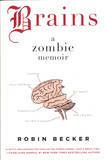 EOS / May 2010
EOS / May 2010
Reviewed by: I.E. Lester
There have been a number of films offering a comedic slant on zombies over the last few years. Some have been good (Shaun of the Dead, Zombieland, Fido) while others have been truly awful (Zombie Strippers comes immediately to mind).
But humorous takes on the undead in book form haven't been all that common — beyond the current trend for re-writing classic literature or history and mashing it up with zombie gore that started with Seth Grahame-Smith's Pride and Prejudice and Zombies and has been followed by a cavalcade of similar titles such as Sense and Sensibility and Sea Monsters, Queen Victoria: Demon Hunter and Abraham Lincoln: Vampire Hunter.
Robin Becker though has, thankfully, come to the rescue of anyone who finds the idea of shambling corpses chasing you and trying to eat your brains funny.
Jack Barnes is – or rather was – a college professor. When a zombie plague is unleashed upon the world, he becomes one of its victims. But Jack is different than other zombies. Undeath may have filled him with the desire to eat human flesh – most especially brains – but he's managed to maintain his intelligence and his ability to read and write.
And so he decides to do what any sane, rational human being might do after having been zombified: He writes a memoir of the whole experience. And through his writing we gain an insight into the zombie mindset — or lack thereof.
Along the way, Professor Jack notices he might not be the only zombie to have retained some human characteristics. He encounters a young boy who is still agile, a nurse who remembers her skills, a soldier who can speak, among others. Intrigued, he sets off on a quest to find the scientist responsible for their respective conditions.
There is only problem: While Jack and his cohorts may have retained their brainpower, only one can actually speak, while only he can actually read. So they have to establish a means of communication to enable them to work together and try to survive the attempts of the remaining humans to kill them.
This book is splendidly light-hearted, a romp with added gray matter, and packed full of reference to the horror genre and modern pop-culture. It's obvious throughout that Becker knows her stuff when it comes to dark fiction. With Brains: A Zombie Memoir, she's taken a friendly sideswipe at zombie fiction in a way that will alienate no one.
Brains: A Zombie Memoir is relatively short, clocking in at just under two hundred pages. When reading it, though, some readers may very well wish it had been even shorter. By halfway through, the jokes start to wear a little thin and the repetition of certain events (i.e. the zombie nurse repairing various characters' injuries) grow tiresome. And the shout-outs to modern media start to feel overdone, as if Becker is trying to reference her entire DVD collection before the story ends. But this is more than just joke after joke about decay and detaching limbs, and these slight faults don’t stop Brains from being a highly entertaining book. It's the literary equivalent to part buddy movie, part road movie, and part a tale of struggle against adversity — all very much tongue in cheek.
Great for refreshing the reading muscles between serious scares.
Purchase Brains: a Zombie Memoir by Robin Becker.
Wolf's Bluff / W.D. Gagliani
 Leisure Books / June 2010
Leisure Books / June 2010
Reviewed by: Joan Turner
Wolf’s Bluff is the third novel in W. D. Gagliani’s action-packed werewolf series, picking up the story of Homicide Detective Nick Lupo where Wolf’s Gambit ends. In the last installment, three mercenaries from the Wolfpaw organization had been murdering members of the reservation tribal council at Eagle River. The killers were werewolves, and up until then, Lupo had believed himself to be the only one afflicted with the curse. Eager to learn if there are more werewolves in Wolfpaw, he travels to Georgia to investigate the organization’s training facilities. There in a confrontation with the group that almost costs him his life, he wonders if any of the members are not werewolves.
Meanwhile, vicious animal attacks are on the rise around Wausau, Wisconsin, the victims mostly homeless people and hikers. Lupo suspects many people reported missing may also number among the dead. Heather Wilson, the female reporter bitten by one of the mercenaries at Eagle River had been presumed drowned, but now she has returned with no explanation, and Lupo believes she may be responsible for the murders. He has her under surveillance. Unknown to either of them, Wausau Detective Sheila Falken is watching Heather as well, and for her own reasons.
Lupo’s relationship with his girlfriend, Jessie Hardin, the reservation doctor, strained since the Eagle River murders, becomes more flammable with his resolve to investigate Wolfpaw. She fears he may trigger another attack upon them by the mercenaries. She turns to gambling at the new reservation casino to relieve stress, yet the breach between the couple widens when Lupo admits he is following the sexy Heather Wilson. Unknown to either of them, a deadly trap is already being laid.
Internal Affairs officer Griff Killian distrusts Lupo and is obsessed with proving he is a maverick cop and possible murderer. Lupo’s police councilor has secretly turned over confidential information to the IA officer, and Killian dogs Lupo’s trail intent on exposing the detective.
Interlaced with flashbacks from Lupo’s troubled youth, as recorded in the journals of Caroline Stewart, the reader sees the difficult lifelong struggle Nick Lupo has faced with his affliction and his efforts to control the beast within himself.
Wolf’s Bluff is the most intense and terrifying novel in W. D. Gagliani’s original and unparalleled horror-crime series. The writing is lean and precise, the characterization suburb. Suspense mounts to a fever pitch as the fast-paced, non-stop action builds towards a bloody confrontation. The dramatic narrative delivers punch after punch, ending with a shocking conclusion that leaves the reader reeling.
Wolf’s Bluff is an excursion into horror that’s not to be missed.
Purchase Wolf's Bluff by W. D. Gagliani.
Animythical Tales / Sarah Totton
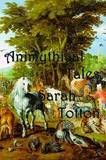 Fantastic Books / February 2010
Fantastic Books / February 2010
Reviewed by: Michele Lee
Slim and unexpected, Animythical Tales by Sarah Totton is a collection of ten tales that have formerly graced the pages of venues like Realms of Fantasy, Fantasy & Science Fiction and Polophony 7. Totton herself is a skilled writer who pens vivid tales of surreal fantasy.
Being far more fantasy than horror immediately puts this collection outside the tastes of the average horror aficionado, however there's no denying there's a dark element to some of Totton's tales. "The Teasewater Five", for example, tells a fanciful tale of a dark nature, centering on a woman who, with the help of her brother, creates a miniature, animated sculpture version of her stillborn son with unexpectedly negative results.
Picking standouts is difficult since all Totton's stories are tempered with strengths of skill and even-timing, as well as settings and characters that stretch the imagination. Favorites are easier to choose, and they include the short, straightforward, yet strikingly dark "The Man with the Seahorse Head", a musing on the nature of parenthood, and "Bluecoat Jack", a tale about the kind of people who trade away their very being to become art.
The stories in Animythical Tales are lyrical and off-beat, betraying a near trademark British precision evocative of masters like Ramsey Campbell. Totton has an almost whimsical take on dark fiction that is both disturbing and enchanting. Readers looking for more fiction outside the traditional horror box will undoubtedly enjoy this one.
Purchase Animythical Tales by Sarah Totton.
Prime / Nate Kenyon
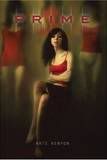 Apex Publications, LLC / July 2009
Apex Publications, LLC / July 2009
Reviewed by: Martel Sardina
Can Nate Kenyon write science fiction? Having read and enjoyed much of Kenyon’s work, I’m not sure why I was skeptical. Maybe it’s because as a writer, science fiction seems to be the hardest genre for me to crack. Building futuristic worlds that are believable is not an easy task. With Prime, Kenyon manages the transition from stories that have typically been labeled “horror” with ease.
William Bellow was the best bug hunter that New London had ever seen. As a natural net sensitive, Bellow was able to identify, contain and eliminate viruses quickly, putting his services in high demand. Six years ago, a job went horribly wrong, forcing Bellow into an early retirement. Now, a new virtual reality program that is capable of blurring the line between man and machine has been infected, leaving several people dead. New London brings Bellow back on board to stop the virus from spreading and causing more deaths.
Bellow doesn’t trust his former employer completely. His memories of the incident that led to his retirement are fractured at best. When he starts investigating the latest murder, he meets Kara, a clone who knows more about him than she should. Why does she look so familiar? And how does she know so much about his past?
From this point on, Kenyon weaves a complex tale of deception. Bellow has friends who oppose what New London is trying to do. They live off the grid and want nothing to do with Transformation, the program that will link man and machine in ways previously unimagined. Are members of the underground resistance trying to sabotage New London’s legacy? Or is the enemy hiding in plain sight in the corporate towers that dwarf the city?
As Bellow tries to crack the case, each turn leaves him with more questions. Are the answers are hidden somewhere in Bellow’s past? Kenyon takes readers on a fast-paced thrill ride, blending the best of noir mystery and science fiction. After a brilliantly executed series of twists, Kenyon delivers an emotionally powerful ending. Fans of authors like Philip K. Dick should find Kenyon’s foray into science fiction a worthy read.
Purchase Prime by Nate Kenyon.
He Stepped Through / Nate Southard
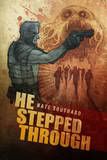 Bloodletting Press / April 2010
Bloodletting Press / April 2010
Reviewed by: Blu Gilliand
Nate Southard claims the FX cop drama The Shield as a major influence on He Stepped Through, his new chapbook from Bloodletting Press, and the first few pages do feel like they’re ripped from the script of that show. A couple of gangbangers gear up and head down to a local restaurant, and they’re not stopping in for fries and a Coke — they’ve got trouble on their mind. Trouble that’s outside the realm of the normal shenanigans they might get up to — trouble triggered by a cryptic line they repeat to one another: “He stepped through.”
Four pages in and blood and brains are pooling on the floor, and Southard absolutely does not let up for the rest of this short but intense tale. When two cops arrive on the scene, they’re more concerned about whether the troublemakers are their own inside guys than the fact that civilians are in danger. But once they are confronted with a scene far more horrific than anything they’ve ever experienced, they realize – as do we, the readers – that the usual cops-n-robbers drama is taking a backseat to something far worse.
Southard introduces a few new characters after this initial bloodbath, people operating on both sides of the badge. The pace is so quick and the page count so short that we don’t really get more than a sketch of the characters, but in this case that’s okay. Everything moves forward in a real-time march toward the madness that is spreading throughout the back alleys of Los Angeles. As the cops race to gain control of the spiraling situation, they discover that someone is planning to take the simmering violence and bad blood that fuels the area’s gang culture and turn it all the way up to boil — and the means they are using to do so is far beyond the boundaries of what they can handle.
Southard introduces some very Lovecraftian ideas into his realistically-drawn portrayal of a city teetering on the edge of gang warfare, and does so with a steady enough hand that he doesn’t upset the whole works. It’s a risky move, but it pays off, even if the explanation of how this supernatural influence has been brought in feels a bit rushed. Southard writes dialogue that rings true for both the cops and the bangers without veering into the territory of the cliché, and he drops clues to the true nature of what’s going on in all the right places.
This is a story meant to be devoured in one gulp, and it’s a thoroughly entertaining diversion. Quick, violent, and downright disturbing, it’s another success story for both Southard and Bloodletting Press.
Purchase He Stepped Through by Nate Southard.
Yaccub's Curse / Wrath James White
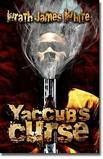 Necro Publications / October 2009
Necro Publications / October 2009
Reviewed by: Norman L. Rubenstein
Some novels work very well operating on a single, basic level - that of telling a story. Then there are novels that add a second level - that of involving and describing strong characters who are interesting over and above the novel's storyline. Perhaps the most impressive novels are those that not only tell a good story and involve strong, intriguing, multi-layered characters, but which also have something to say, something to try and teach us concerning matters of socio-economic, religious or moral, and/or political importance. In Yaccub's Curse, author Wrath James White impressively succeeds in presenting readers with a haunting novel that proceeds to tell an interesting story, filled with fascinating people and which manages to raise important issues of race, economics, and religion without being at all "preachy."
The novel's protagonist, Malik Black, is young Black-American man, not yet twenty, who has grown up in the Germantown (or "G-town") ghetto neighborhood located in Philadelphia, PA. Malik, we soon learn is nicknamed "Snap" - because his temper is as quick as his trigger finger. He is the novel's narrator, a smart and even eloquent teen, but definitely no Beaver Cleaver.
Malik recounts his growing up: his Vietnam Vet of a father who was a hard worker, but also a hard drinker who would beat up on his mom and even his four year old self when dad was drunk. Eventually, when he was about eight, his mom left her husband and moved into G-town to live with her mother, Malik’s maternal grandmother. Malik recounts as to how his very first day, while still in the process of moving in, the local kids started his "initiation" by beating him up - and how he won his first fight and took from the bigger kid his new, name-brand sneakers which in turn cemented Malik’s place in his new community.
Malik's first two friends in G-town were Warlock, age 16 and a would-be pimp and his little brother, Nikky, who was Malik’s age and was in the gifted child program, and at age 8 could compose complex poetry which he utilized in being a young master-rapper despite being shy and quiet. They'd both been born in the even “worse” slum of North Philly, and it was only Warlock's illegal activities that enabled them to stay out of that area. Malik and Nikky find common ground in comic books. Malik identified with The Hulk because by then he was, at age 8, already 5' tall and feared by all the other neighborhood kids his age.
Malik, once he is a few years older and now the reigning fighter at his school also at first has a confrontation with two brothers who’ve just moved into the neighborhood and have fearsome reputations of their own. The older brother, Tank, is huge for his age and a ferocious fighter himself. But, as Malik finds out, Tank’s younger brother, Huey, a thin, small kid that looks more like a lover than a fighter is actually the more fearsome and impressive of the two. Malik’s relationship with these two moves from hostility to becoming as close as brothers.
Author White paints evocative pictures with words. As one example, here’s Malik describing his neighborhood on a typical summer’s day:
“Wasn’t much of anything going down in the G that day. Water gun fights, crack pipes flickering in the dark alleys that provided the only shade on our treeless little street. Those who had someone to fuck were sweating in their lover’s embrace propagating the next generation of the poor, hopeless, and pissed-da-fuck-off. Hip-hop music boomed from every radio, the bass thundering like the ghetto’s heartbeat, a testosterone thunder-drum pounding out the rhythm and song of Black rage and rebellion.”
Then there’s Malik responding, after class while they are alone, to his teacher’s question as to why this brilliant honor’s student will speak perfect, even eloquent, grammatical English while in class, yet insists upon reverting to “ghetto-speak” outside of school:
“Because I don’t live in the world of books and poetry. I live in the damned ghetto and what good is language except to communicate? What good are fancy words that no one understands? I talk to you this way because this is what you understand. But I talk slang in the street because that’s the language they understand out there. My mom taught me that the dialects of the streets are just as complex and beautiful as the Queen’s English and that I should learn that language just as well as book language so that I can communicate with everyone. You see, Black folks have to live in two worlds, the world of Business and Academia, the White world, and the world of the streets. You feel me?”
Wrath James White is able to relate to readers what growing up as a young, disadvantaged Black in an American ghetto actually means, but does so in a matter-of-fact manner that brings it vividly to life for the reader while never interrupting the flow of the underlying story itself.
Yaccub’s Curse, while in part focusing on Malik and his family and friends, also centers around the novel’s chief antagonist and villain, Scratch. He is white/Caucasian and a drug dealer from North Philly who is extremely dangerous and brutal, and speaks in an exaggerated ghetto patois that verges upon the humorous – but nobody ever laughs at Scratch, at least if they want to continue breathing. Scratch employed an army of over a thousand drug pushers, of which the worst and most violent, who was also the best pure salesman for drugs, and who was his de facto second in command was Yellow Dog - who is also very light skinned, and could almost pass for “White.” Scratch also has a "thing" for very pregnant whores. He kills one young Muslim woman who had an unfortunate Crack addiction and as per the police who found her buried body, it looked as if someone had used his bare hands and teeth to rip out her unborn child from her womb.
Malik's very first introduction to Scratch is when Malik is a young child and sees Scratch shoot a Jamaican drug dealer in the head and then scoop out and eat his brains, something that Scratch makes a habit of doing for reasons best left to the reader to discover – and it is telling that Malik is neither horrified nor disgusted nor sickened by this, but rather fascinated and curious. Malik next meets up with Scratch a few years later on a fateful day while Malik is in the company of Huey and Tank and the encounter leads to all three of them eventually working for Scratch, with Malik becoming Scratch’s trusted advisor and chief enforcer. How and why the relationship between Malik and Scratch turns from one of mutual trust and friendly employer and employee to mortal enemies is a principal plot point of the novel.
While the horror that seems an integral part of what experiencing life from within the modern American ghetto entails – the almost unimaginable indignities that man can perpetrate upon his fellow man – is certainly sufficient in and of itself to rightly categorize Yaccub’s Curse as a horror novel, author White adds a fascinating and terrifying supernatural element to the novel’s storyline that doubly ensures the novel’s categorization as “horror.” The novel’s title itself refers to a tenet of belief of the Black Muslim faith, as espoused by Elijah Muhammad and his followers, that Black people are superior to all other peoples and that the White race are devils and were created from genetic material of the Black race by an evil scientist, Yaccub, on the island of Patmos, approximately 6,600 years ago, and that eventually the original Black race will overcome and regain dominance over the “tricks and lies” utilized by the artificially created White race that have held them in subservience for over 6,000 years. The author utilizes this belief as a starting point and then performs a brilliant cognitive improvisational riff that will keep readers on the edge of their proverbial seats through to the novel’s very last sentence.
Yaccub’s Curse is a genuinely frightening novel of supernatural horror that will also gently provide a true “teachable moment” for those of use not having been ourselves neither Black nor brought up in one of our American ghettos of what life is like there and what conditions and even horrors such a life can engender, as well as learning how much we are yet all alike and similar under our skins in our capacities to love, learn, and aspire, and in our failings and flaws. It is an absolutely riveting read and well worth taking the journey. This is a novel that could, and probably should be considered for high school and college literature courses throughout the USA, but that, in all events, will enlighten as well as entertain. Kudos to both author Wrath James White and to publisher Necro Publications for having released this novel.
Purchase Yaccub’s Curse by Wrath James White:
The Blue Moon Café / Rick R. Reed
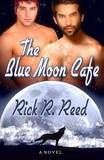 Amber Quill Press / March 2010
Amber Quill Press / March 2010
Reviewed by: Derek Clendening
There is some debate among horror professionals today about whether or not paranormal romance rightly constitutes horror. This reviewer generally argues that it doesn’t, but The Blue Moon Café by Rick R. Reed helps to bridge the gap between the two camps. Thad Matthews, a young gay man residing in Seattle, takes the chance to spice up his love life when he meets Sam, a sexy Italian restaurateur and proprietor of the titular eatery. Their blossoming romance is juxtaposed against a rash of brutal killings within Seattle’s gay community, with all signs pointing to a wolf-like perpetrator. When a new acquaintance of Thad’s mysteriously disappears, questions and uncertainties about Sam’s nocturnal whereabouts rise along with the body count.
The Blue Moon Café begs the question of whether or not an LGBT-themed novel can be enjoyed by a mainstream or genre audience. Reed offers his audience a completely relatable, authentic protagonist in Thad Matthews — recently unemployed, single, and jerked around in the romance department on more than one occasion like so many of all sexual orientations. He then meets Sam who is handsome, sophisticated and an iron man beneath the sheets, and yet he still seems unable to catch a break. Not all novels come with as readymade a sympathetic character as Thad Matthews, and Reed deserves props for the character’s universal appeal. Still, some of the book’s particulars about a gay man’s life or the passive (but perfectly acceptable) use of lingo might be less inviting for a mainstream audience.
Regarding the plot itself, Reed simply gives away too much too soon. While he veers away from the beaten path to some extent, the plot does not take a sufficient enough twist to leave the reader with the sense of shock or awe that it had the potential to. The end twist is fairly predictable. Some books do give away a generous chunk of information in advance because it is integral to the storytelling, but this is not one of those books. Depending on why a reader has chosen to open this book in the first place, its predictability may be either entirely forgivable or completely off-putting – but it will depend upon the reader’s expectations. That said, Reed brilliantly pours the much of society’s lingering hatred and bigotry toward gays into the werewolf metaphor, giving lycanthrope fiction a refreshing spin.
The Blue Moon Café is a novel with some potential to appeal to a larger audience, but ultimately the appeal may be limited to the LGBT or paranormal romance reader. The novel may be less enticing for, say, readers of Leisure or St. Martin’s harder-core horror novels, who have come to expect a grittier, gorier story they can sink their teeth into. Still, because the novel is more accomplished than much of the work published by smaller press paranormal romance, The Blue Moon Café is deserving of a read under the light of the next full moon.
Purchase The Blue Moon Café by Rick R. Reed




